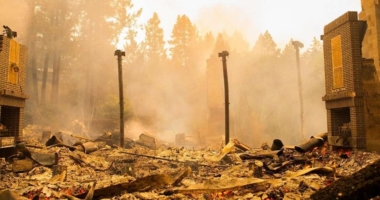Climate, Health and Equity Brief
Celebrating climate commitments, innovation and activism in 2020
December 23, 2020

Hot Topic: Hope. As we approach the end of an unprecedented year of climate extremes, including a historic wildfire season in the West and a record-setting storm season in the Gulf and East coasts, the effects of the climate crisis are more intense and visible than ever. And yet, thanks to a number of developments in 2020 that signal a growing commitment to curbing the worst effects of climate change, the world may be approaching a turning point on climate action. Below are the top six climate moves from the past year that give us hope for 2021 and beyond.
- Global commitments to climate. Despite a global pandemic and its impact on the economy, climate action remained a top priority around the world. Major world leaders this year led the growing shift away from fossil fuels with significant climate commitments. China, the EU, Japan, New Zealand and South Korea all made pledges to achieve carbon neutrality, while Denmark, Poland, Sweden and the UK announced plans to phase out fossil fuels in favor of renewable forms of energy.
- The impending shift in U.S. politics. Record-breaking voter turnout this November brought climate action back to the White House. With the inauguration now just one month away, the incoming Biden administration has set the stage for major policy shifts in favor of climate action in the U.S. President-elect Biden’s pledge to re-enter the Paris Agreement along with his $2 trillion climate plan, environmental justice proposal and Plan for Tribal Nations indicate real investments in climate. And newly-announced leadership picks for the EPA, Interior Department and the pioneering White House Office of Domestic Climate Policy will put climate experts—not former heads of fossil fuel companies—in charge of the most urgent crisis of our lifetimes.
- Divestment from fossil fuels. Pressure from stakeholders and activists led entities ranging from universities to pension funds to divest from fossil fuels this year. Twelve cities—including Berlin, Bristol, Cape Town, Durban, London, Los Angeles, Milan, New Orleans, New York, Oslo, Pittsburgh and Vancouver—have divested or committed to divest from fossil fuels this year, furthering the shift set in motion by world leaders. All major U.S. banks have pledged not to fund oil and gas drilling in the Arctic National Wildlife Refuge. And the Vatican has urged church leaders to do the same and instead support commitments to reduce emissions and protect the environment.
- Technological innovation. Emerging technologies from around the world are innovating on ways to reduce waste, expedite reforestation, recycle plastics and switch to climate-friendly product alternatives. Large corporations including Microsoft and United Airlines have also invested in developing emerging carbon capture technologies, and innovative commitments by automakers including General Motors will boost future production of zero-emission vehicles. And in the public sector, new technology in a recently launched NASA satellite will improve the tracking of sea level rise.
- Emphasis on environmental justice. This year was also a moment of reckoning for racial injustice and the disproportionate impact of climate change and pollution on BIPOC communities and across the nation. New legislation in New Jersey will restrict new sources of industrial pollution that disproportionately impact minority communities while a new environmental tax in Denver will fund green spaces in redlined areas of the city. Initiatives in New York and Texas will ensure climate funding for low-income communities and communities of color. And the first round of funding from the Bezos Earth Fund included a historic $151 million in grants to organizations focused exclusively on environmental justice, which have historically received less than one percent of philanthropic climate funding.
- Climate activism among youth. Youth activists were among the most vocal supporters of climate action this year, moving from the in-person marches and demonstrations of 2019 to new forms of protest. From the classroom to their job searches, young people advocated for environmental justice and took a stance against companies who support fossil fuel behemoths. And the adults are listening—young activists on the UN Youth Advisory Group on Climate Change now advise the secretary-general on climate action.
As we emerge from the COVID-19 crisis that has defined 2020, we must begin the new year with an eye toward preventing future catastrophes. Climate change is the greatest challenge of our lifetimes, and every step toward climate action—every pledge, boycott, innovation and divestment—gives us hope that we will leave the planet and its future generations with a safer, healthier and more equitable world.
— Matt & Traci, GMMB
Programming note: The Brief will be on hiatus for the holidays, returning to your inbox on Friday, January 8. We wish you all a healthy, safe and restful holiday break.
Kicker
Check out this list of 12 books on climate and the environment to read while the Climate, Health & Equity Brief is on hiatus for the holidays.






